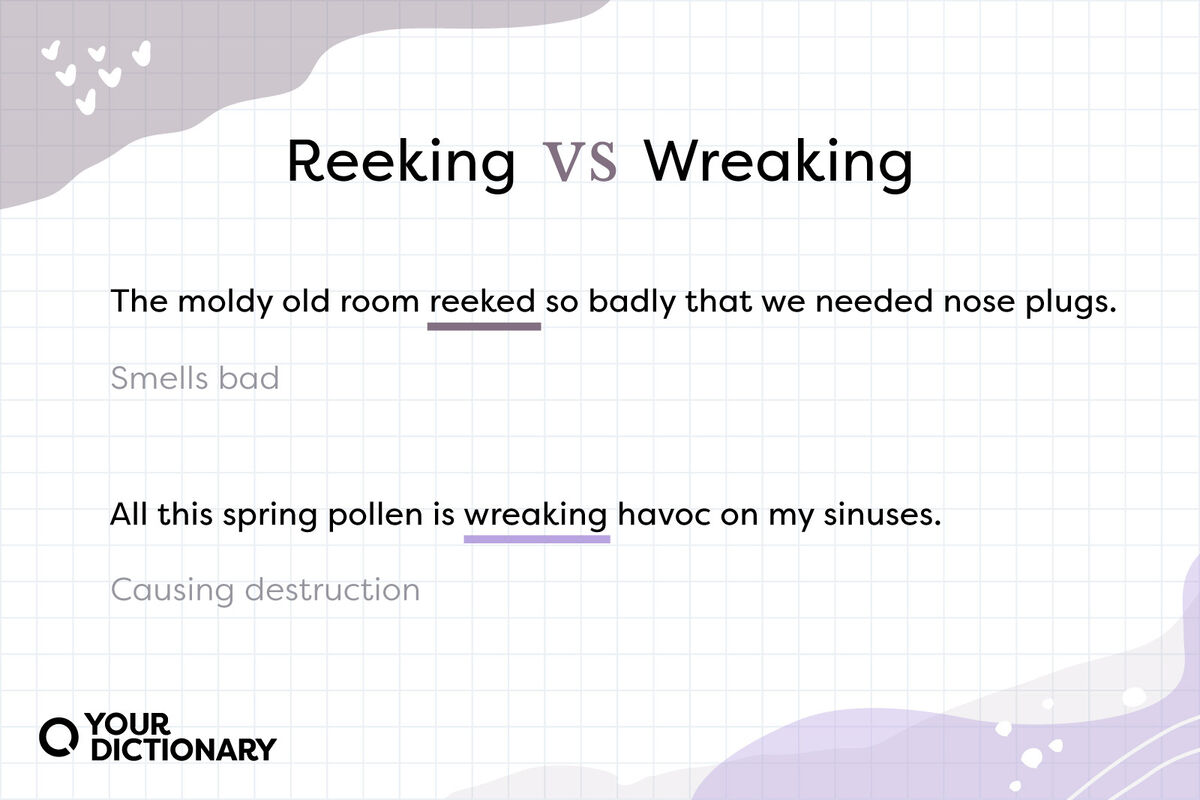
“Reeking havoc” is quite different from “wreaking havoc.” One refers to causing trouble, and the other refers to trouble that smells extremely bad. Are you using the correct phrase to describe your non-stinky chaos?
It’s Wreaking Havoc, Not Reeking Havoc
When you’re describing someone or something that causes trouble and/or destruction (both figurative and literal), you say they’re “wreaking havoc,” not “reeking havoc.” For example:
- The destructive hurricane is wreaking havoc on the small coastal community.
- All this spring pollen is wreaking havoc on my sinuses.
- News of the banks closing has wreaked havoc on the stock market.
- The neighbor’s dog constantly wreaks havoc on our street with his barking and fence destruction.
Wreaking Means Causing
The word wreak means “to cause or inflict” in the sense of causing harm. It comes from the Old English wrecan and Dutch wreken, both of which mean “to drive out,” as do the related words wreck (“to destroy”) and wretch (“a destroyed person”).
As a transitive verb like give or hate, wreak requires an object to make sense. A person can’t just wreak, they have to wreak something — and colloquially, they’re usually “wreaking havoc” (“causing destruction”).
Where Does Havoc Come From?
Wreaking means “causing,” but what about havoc? The noun means “destruction” or “devastation,” and comes from the Old French phrase crier havot, meaning “to cry havoc.” It was a battle call for soldiers to pillage and plunder a town — the essence of “devastation.” Today, havoc typically appears in the phrase “wreak havoc,” but one can also “play havoc,” “cause havoc,” “unleash havoc,” or “raise havoc.”
Things That Wreak
While you’ll typically find wreak and havoc together, you may also find wreak in other sentences about causing harm or inflicting punishment, including:
- The warrior swore to wreak his revenge on the man who’d killed his father.
- California’s wildfires wreak destruction on small, rural communities.
- Comic book villains love to wreak mayhem on their unsuspecting cities.
- When the time is right, we will wreak our vengeance.
Reeking Means Smelly
The word reek means “to stink.” It comes from the Old English recan, meaning “to emit smoke,” and has since expanded past malodorous smoke to include all the bad smells you can think of.
Unlike wreak, reek is an intransitive verb — it doesn’t need an object to make sense. For example, “Old fish can reek,” but something can’t “reek old fish.” It needs a preposition between reek and the object of the sentence (“This reeks like old fish.”)
Things That Reek
Reek typically refers to literal smells in the air. Rarely, it can be a synonym for stink when an experience is bad (as in “This band reeks”). Examples of reek in a sentence include:
- The moldy old room reeked so badly that we needed nose plugs.
- Please don’t microwave fish in the office kitchen; it makes the whole office reek.
- The trash started to reek of eggs and old coffee.
- Justin’s parents grounded him because he reeked like cigarette smoke.
How To Remember the Difference
So how can you avoid saying "reeking havoc" in the future? Unless you’re referring to destruction that smells particularly bad, remember: Wrecking balls wreak havoc. As long as you connect wreck and wreak, you should avoid this common error going forward.